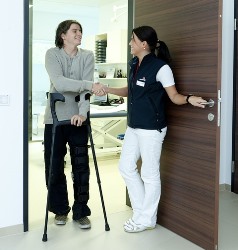How to Enroll In the Right LPN or LVN Program Near Philadelphia Pennsylvania
 Now that you have decided on a rewarding career in the field of nursing, it's imperative that you select a Licensed Practical Nurse (LPN) college near Philadelphia PA that will provide the proper training. If you reside in Texas or California, then you will be looking for a Licensed Vocational Nurse (LVN) school instead. There is no distinction, except for the names, between an LPN and an LVN. They both carry out the same job functions and work in healthcare facilities under the guidance of Registered Nurses (RN) or Doctors. However their functions do vary depending on the state they practice in, which we will look at in the next section. When beginning their search for schools, many prospective nursing students start with those that are the nearest to their residences or that are the least costly. While cost and location are relevant factors, they are not the only qualifications that you should base your selection on. Other variables, for instance if the schools are accredited or have high pass rates on the licensing exam are very important too. There are additional questions that you should ask prospective schools before enrolling in a LPN or LVN program that we will talk about later in this article. But first, let's have a look at the role of an LPN and what is involved in the education and licensing process.
Now that you have decided on a rewarding career in the field of nursing, it's imperative that you select a Licensed Practical Nurse (LPN) college near Philadelphia PA that will provide the proper training. If you reside in Texas or California, then you will be looking for a Licensed Vocational Nurse (LVN) school instead. There is no distinction, except for the names, between an LPN and an LVN. They both carry out the same job functions and work in healthcare facilities under the guidance of Registered Nurses (RN) or Doctors. However their functions do vary depending on the state they practice in, which we will look at in the next section. When beginning their search for schools, many prospective nursing students start with those that are the nearest to their residences or that are the least costly. While cost and location are relevant factors, they are not the only qualifications that you should base your selection on. Other variables, for instance if the schools are accredited or have high pass rates on the licensing exam are very important too. There are additional questions that you should ask prospective schools before enrolling in a LPN or LVN program that we will talk about later in this article. But first, let's have a look at the role of an LPN and what is involved in the education and licensing process.
It Only Takes a Few Minutes to Start Your LPN or LVN Career Below
LPN and LVN Job Description

Licensed Practical Nurses have a number of duties that they perform in the Philadelphia PA health facilities where they work. As their titles indicate, they are required to be licensed in all states, including Pennsylvania. Although they may be responsible for managing Certified Nursing Assistants (CNA), they themselves typically work under the direction of either an RN or a doctor. The health care facilities where they work are numerous and diverse, such as hospitals, medical clinics, schools, and long-term care facilities. Anyplace that you can find patients in need of medical assistance is their domain. Each state not only oversees their licensing, but also what functions an LPN can and can't perform. So depending on the state, their routine work functions may include:
- Taking vital signs
- Providing medications
- Initiating IV drips
- Overseeing patients
- Getting blood or urine samples
- Keeping patient records
- Supporting physicians or Registered nurses with procedures
Along with their work functions being controlled by each state, the health facilities or other Philadelphia PA healthcare providers where LPNs work can further limit their job roles within those parameters. Also, they can work in numerous specialties of nursing, including long-term care, critical care, oncology and cardiology.
LVN and LPN Certificates and Degrees
There are essentially two scholastic credentials offered that provide instruction to become an LPN or LVN near Philadelphia PA. The one that can be concluded in the shortest period of time, normally about 12 months, is the certificate or diploma program. The other alternative is to obtain a Practical Nursing Associate Degree. These LPN programs are more comprehensive in nature than the diploma alternative and commonly require 2 years to finish. The advantage of Associate Degrees, besides supplying a higher credential and more comprehensive instruction, are that they furnish more transferable credit toward a Bachelor's Degree in nursing. No matter the kind of credential you pursue, it needs to be state approved and ideally accredited by the National League for Nursing Accrediting Commission (NLNAC) or some other national accrediting organization. The NLNAC attests that the syllabus effectively prepares students to become Practical Nurses, and that most graduates pass the 50 state required NCLEX-PN licensing exam.Enrolling in LPN and LVN Courses Online
 Enrolling in LPN schools online is growing into a more in demand way to receive instruction and attain a nursing certificate or degree in Philadelphia PA. Many schools will require attendance on campus for part of the training, and virtually all programs call for a specified amount of clinical rotation hours carried out in a local healthcare center. But since the balance of the training can be accessed online, this option may be a more practical solution to finding the free time to attend college for many students. Regarding tuition, some online degree programs are less costly than other on campus alternatives. Even additional expenses such as for commuting and study materials may be reduced, helping to make education more affordable. And numerous online programs are accredited by U.S. Department of Education recognized organizations. And so if your work and household responsibilities have left you with little time to pursue your academic goals, it could be that an online LPN training program will make it easier to fit a degree into your active schedule.
Enrolling in LPN schools online is growing into a more in demand way to receive instruction and attain a nursing certificate or degree in Philadelphia PA. Many schools will require attendance on campus for part of the training, and virtually all programs call for a specified amount of clinical rotation hours carried out in a local healthcare center. But since the balance of the training can be accessed online, this option may be a more practical solution to finding the free time to attend college for many students. Regarding tuition, some online degree programs are less costly than other on campus alternatives. Even additional expenses such as for commuting and study materials may be reduced, helping to make education more affordable. And numerous online programs are accredited by U.S. Department of Education recognized organizations. And so if your work and household responsibilities have left you with little time to pursue your academic goals, it could be that an online LPN training program will make it easier to fit a degree into your active schedule.
Things to Ask LPN and LVN Programs
Now that you have decided on obtaining your LPN certificate, as well as if you will attend classes on campus or on the web, you can use the following pointers to start narrowing down your choices. As you no doubt are aware, there are numerous nursing schools and colleges near Philadelphia Pa as well as within Pennsylvania and throughout the United States. So it is essential to lower the number of schools to select from so that you will have a manageable list. As we previously discussed, the site of the school as well as the expense of tuition are most likely going to be the initial two factors that you will take into consideration. But as we also stressed, they should not be your only qualifiers. So before making your final selection, use the following questions to see how your selection measures up to the field.
- Accreditation. It's a good idea to make sure that the certificate program in addition to the school are accredited by a U.S. Department of Education recognized accrediting agency. Besides helping ensure that you obtain an excellent education, it may assist in obtaining financial aid or student loans, which are often not provided for non-accredited schools near Philadelphia Pennsylvania.
- Reputation. Check internet rating services to see what the evaluations are for all of the LPN schools you are looking into. Ask the accrediting agencies for their reviews as well. Additionally, contact the Pennsylvania school licensing authority to determine if there are any complaints or compliance issues. Finally, you can call some nearby Philadelphia PA healthcare organizations you're interested in working for after graduation and ask what their judgements are of the schools as well.
- Internship Programs. The most effective way to obtain experience as a Licensed Practical Nurse is to work in a clinical setting. Essentially all nursing degree programs require a certain number of clinical hours be completed. A number of states have minimum clinical hour prerequisites for licensing as well. Check if the schools have a working relationship with local Philadelphia PA community hospitals, clinics or labs and help with the placement of students in internships. Also, it's important that you choose a school that offers clinical training in the type of facility you are most interested in. For example, if you want training and experience in pediatric care, make sure that the school you choose provides adequate clinical rotation in an area Pediatric Hospital.
- Licensing Preparation. Licensing criteria for LPNs are different from state to state. In all states, a passing score is needed on the National Council Licensure Examination (NCLEX-PN) in addition to graduation from an approved school. Many states require a specified number of clinical hours be completed, as well as the passing of additional tests. It's important that the school you are attending not only delivers an outstanding education, but also readies you to meet the minimum licensing requirements for Pennsylvania or the state where you will be working.
- Graduation and Job Placement Rates. Find out from the LPN schools you are considering what their graduation rates are as well as how long on average it takes students to complete their programs. A low graduation rate may be an indication that students were displeased with the program and dropped out. It's also important that the schools have high job placement rates. A high rate will not only confirm that the school has a superb reputation within the Philadelphia PA medical community, but that it also has the network of relationships to assist students gain employment.
- NCLEX Exam Pass Rate. Once you receive your certificate or diploma, you must sign up for and pass the National Council Licensure Examination for Practical Nurses (NCLEX-PN). Enrolling in a school with at least a 75% pass rate is highly preferred. Lower pass rates may indicate that a school’s program, curriculum or instructors are ineffective in teaching its students. You can find out from the school what their passing rate is for the last 5 years, or request the information from the State Board of Nursing.
More Info on How to Become an LVN or LPN in Philadelphia
Pick the Right Philadelphia Licensed Practical Nurse Program
Picking the ideal Licensed Practical Nurse program is potentially the most crucial phase to beginning a new career in the medical care industry. There are a number of factors that you need to take into account when choosing a nursing school. These variables will be prioritized differently depending on your current career goals, lifestyle, and economic status. As we have highlighted in this post, it is critical that you pick an LPN college and a certificate or degree program that are both accredited and have outstanding reputations within the healthcare community. By using our list of qualifying questions, you will be able to create a short list of schools to choose from so that you can make your ultimate selection. And with the appropriate degree and training, combined with your dedication and ambition to succeed, you can become a Licensed Practical Nurse in Philadelphia Pennsylvania.
PHILADELPHIA LPN OR LVN TRAINING | PHILADELPHIA LPN OR LVN PROGRAMS
